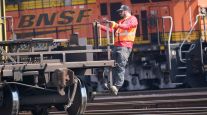Senior Reporter
Railroads Told to Turn Over Evidence in Fuel Surcharge Suit

[Stay on top of transportation news: Get TTNews in your inbox.]
In a move that could help speed up the path to a trial, a District of Columbia federal judge ruled in a multidistrict federal lawsuit that more than 200 shippers are entitled to pursue certain evidence to support their allegation that the four largest Class I railroads may have conspired to fix fuel surcharge prices.
The contentious allegations have been the object of a fiery debate in the nation’s federal courts since 2007.
After class certification for the shippers was denied for a second time in 2019, the shippers filed individual actions in district courts across the country to pursue their conspiracy claim.
Plaintiffs in the complex civil action, known as “In re Rail Freight Fuel Surcharge Antitrust Litigation” (in part styled Oxbow Carbon & Minerals, et al., v. Union Pacific Railroad Co., et al.) have accused the four railroads of conspiring to engage in fuel surcharge price-fixing since 2003.
The railroads are Union Pacific, CSX Transportation Inc., Norfolk Southern Railway Co. and BNSF Railway.

Mergers and acquisitions have reshaped the trucking technology sector over the past decade, but what does this trend mean for the trucking and logistics companies that rely on these technologies? Seth Clevenger speaks with James Langley of Trimble Transportation. Hear a snippet, above, and get the full program by going to RoadSigns.TTNews.com.
Allegations contained in the lawsuit maintain that the four rail operators have been coordinating their fuel surcharge programs “as a means to impose supra-competitive total price increases on their shipping customers.”
The lawsuit also alleges that the railroads “conspired to impose rail fuel surcharges that far exceeded any of [their] fuel costs.”
A rail fuel surcharge, as defined by the shippers, is a separately identified fee that is charged by the railroads for agreed upon transportation services, purportedly to compensate for increases in the cost of fuel.
In a 2007 decision on rail fuel surcharges, the U.S. Surface Transportation Board determined the practice of applying a fuel surcharge that recoups more than the increased fuel costs reflected in a base rate constitutes “an unreasonable practice.”
The railroads have denied there is a conspiracy, arguing that the plaintiffs have improperly attempted to infer a conspiracy based on similar actions taken by each of the rail carriers with respect to certain traffic.
“The anticompetitive actions of the railroads have, however, frustrated the goal of promoting competition,” shippers have argued in their legal court filings. “Since the deregulation of the railroad industry in 1980, the industry has become much more concentrated.”
In the multidistrict case, the railroads have sought to exclude more than 50 documents in their entirety, documents that the rail companies said “reflect numerous communications ranging from phone and email exchanges to in-person meetings, each with varying participants.”
The four railroads have said that rail carriers need to communicate with each other about issues such as fuel surcharges, that “do not come neatly packaged in interline and non-interline boxes, and that such broad discussions or agreements may, as a whole, be subject to exclusion by the statute.”
But in a win for the shippers, D.C. District Court Judge Paul Friedman on Feb. 19 disagreed with the rail defendants’ request to “enforce the statutory bar” on inferring a conspiracy from specified evidence.
“Upon consideration of the written submissions, the relevant case law, the oral arguments presented by counsel at a motions hearing on Aug. 26, 2020, and relevant portions of the record in this case, the court will deny defendants’ motions,” Friedman wrote in his 56-page decision.
Want more news? Listen to today's daily briefing below or go here for more info:


